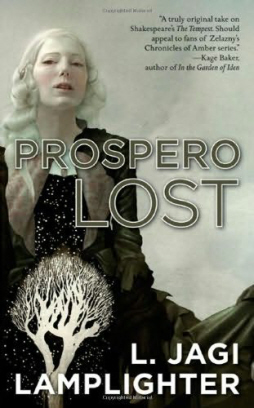 Prospero Lost, by L. Jagi Lamplighter
Prospero Lost, by L. Jagi Lamplighter
Tor (448 pages, $7.99, June 2010)
Prospero Lost is the first book of a trilogy and the first published novel by L. Jagi Lamplighter, whose name I assume is not a pseudonym, though it sounds as if it could be a character in her own book. As you might gather from the title, the story has something to do with what many critics perceive as Shakespeare’s alter ego in his final play, The Tempest, while also somehow involving hell and rebellious offspring given the allusion to Milton’s Paradise Lost. What you might not expect is just about every fantasy trope you can think of, including (I kid you not), Santa Claus.
It’s perhaps not surprising that Lamplighter is married to John C. Wright, who also favors the everything-including-the-kitchen sink approach to fantasy and manages to make it work. In many respects, Lamplighter’s book reminds me of Wright’s Chronicles of Chaos series which deals with the foibles of family relationships among seeming humans possessed of fantastical natures. Of course, the root of this is Greek/Roman mythology in which imperfect gods irrationally vie among each other out of jealously, envy, egotism or other petty and irrational motivations. They are, in other words, normal human beings dressed up in magical togas.
According to Lamplighter, the inspiration for her novel’s fantasy world stemmed from a roleplaying game.
Somewhere in the early Nineties, John and I were invited to play in a roleplaying game run by a friend. He was a new moderator for us, so I decided to write a short story demonstrating what my character could do, so there would be no misunderstandings. For my character, I picked Miranda, the daughter of the magician Prospero from Shakespeare’s Tempest, only in the game, Prospero would turn out to be one of the magicians in the game background…We only played in that game a few times, but I liked the character and the story I had written.
Miranda is the narrator and focus of the novel (indeed, the overarching title of the trilogy is Prospero’s Daughter) and Prospero remains totally off-stage. He is lost, and Miranda is trying to find out what happened to him.
…
Read More Read More
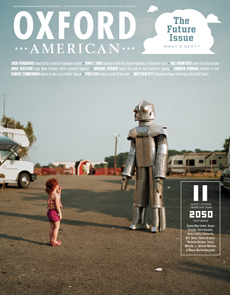 Oxford American Magazine is a literary quarterly focusing on Southern culture. A particular favorite of mine is its annual music issue that features articles on both well-known and obscure Southern musicians with an accompanying CD. The current fall issue’s theme is the future, including 11 short stories set somewhere around in 2050. I’m not familiar with these authors, the one exception being Charles Yu whose first novel, How to Live Safely in a Science Fictional Universe, has been getting some attention.
Oxford American Magazine is a literary quarterly focusing on Southern culture. A particular favorite of mine is its annual music issue that features articles on both well-known and obscure Southern musicians with an accompanying CD. The current fall issue’s theme is the future, including 11 short stories set somewhere around in 2050. I’m not familiar with these authors, the one exception being Charles Yu whose first novel, How to Live Safely in a Science Fictional Universe, has been getting some attention.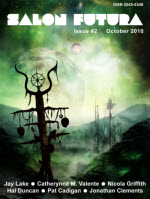
 have been several attempts to do this sort of thing, most of which have had short life spans (anyone remember the
have been several attempts to do this sort of thing, most of which have had short life spans (anyone remember the  If you don’t understand the headline, you’re probably too young to remember Max Headroom, originally a British television movie that became a short-lived series for American broadcast (1987-1988) featuring a computer generated talking head–that would be Max–who later became a music video host, a “spokesperson” for New Coke (and if you don’t know what New Coke was, you’re really too young to care about this), and later brought out of retirement in the United Kingdom to explain the switch from analog to digital TV (this, you might remember). Though, today, any 12 year old with a cheap laptop could probably program a character like Max, back in the 1980s this was beyond the technical reach and budget constraints of broadcast television; Max was played by Canadian actor Matt Frewer outfitted in a latex get-up to make him appear pixalated.
If you don’t understand the headline, you’re probably too young to remember Max Headroom, originally a British television movie that became a short-lived series for American broadcast (1987-1988) featuring a computer generated talking head–that would be Max–who later became a music video host, a “spokesperson” for New Coke (and if you don’t know what New Coke was, you’re really too young to care about this), and later brought out of retirement in the United Kingdom to explain the switch from analog to digital TV (this, you might remember). Though, today, any 12 year old with a cheap laptop could probably program a character like Max, back in the 1980s this was beyond the technical reach and budget constraints of broadcast television; Max was played by Canadian actor Matt Frewer outfitted in a latex get-up to make him appear pixalated.

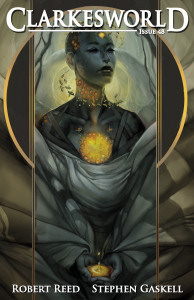
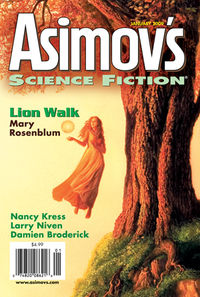
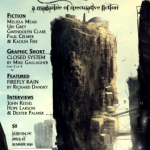 The unfortunately named Bull Spec (I’m assuming this is a reference to Bull Durham tobacco and/or the Kevin Costner movie that takes place in Durham, N.C. where the magazine is based and its intent to feature local writers of “speculative fiction”) has published its
The unfortunately named Bull Spec (I’m assuming this is a reference to Bull Durham tobacco and/or the Kevin Costner movie that takes place in Durham, N.C. where the magazine is based and its intent to feature local writers of “speculative fiction”) has published its 
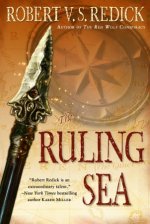 I’m on vacation, but for the one or two (and I’m probably overestimating) of you whose Saturday is not complete without something from me in this space, you can read my
I’m on vacation, but for the one or two (and I’m probably overestimating) of you whose Saturday is not complete without something from me in this space, you can read my  Following up on
Following up on 